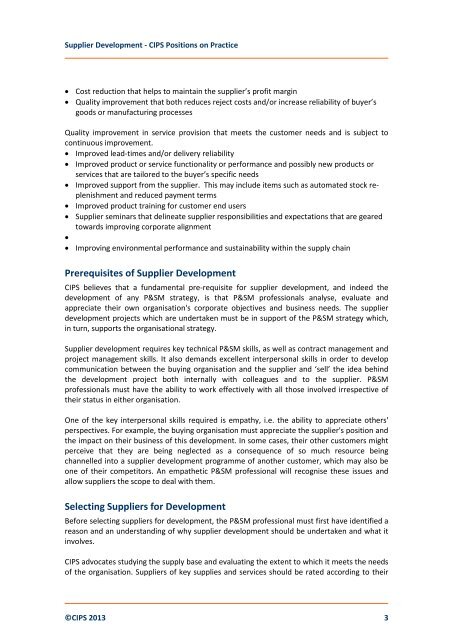P&SM: Supplier Development
You also want an ePaper? Increase the reach of your titles
YUMPU automatically turns print PDFs into web optimized ePapers that Google loves.
<strong>Supplier</strong> <strong>Development</strong> - CIPS Positions on Practice<br />
• Cost reduction that helps to maintain the supplier’s profit margin<br />
• Quality improvement that both reduces reject costs and/or increase reliability of buyer’s<br />
goods or manufacturing processes<br />
Quality improvement in service provision that meets the customer needs and is subject to<br />
continuous improvement.<br />
• Improved lead-times and/or delivery reliability<br />
• Improved product or service functionality or performance and possibly new products or<br />
services that are tailored to the buyer’s specific needs<br />
• Improved support from the supplier. This may include items such as automated stock replenishment<br />
and reduced payment terms<br />
• Improved product training for customer end users<br />
• <strong>Supplier</strong> seminars that delineate supplier responsibilities and expectations that are geared<br />
towards improving corporate alignment<br />
•<br />
• Improving environmental performance and sustainability within the supply chain<br />
Prerequisites of <strong>Supplier</strong> <strong>Development</strong><br />
CIPS believes that a fundamental pre-requisite for supplier development, and indeed the<br />
development of any P&<strong>SM</strong> strategy, is that P&<strong>SM</strong> professionals analyse, evaluate and<br />
appreciate their own organisation's corporate objectives and business needs. The supplier<br />
development projects which are undertaken must be in support of the P&<strong>SM</strong> strategy which,<br />
in turn, supports the organisational strategy.<br />
<strong>Supplier</strong> development requires key technical P&<strong>SM</strong> skills, as well as contract management and<br />
project management skills. It also demands excellent interpersonal skills in order to develop<br />
communication between the buying organisation and the supplier and ‘sell’ the idea behind<br />
the development project both internally with colleagues and to the supplier. P&<strong>SM</strong><br />
professionals must have the ability to work effectively with all those involved irrespective of<br />
their status in either organisation.<br />
One of the key interpersonal skills required is empathy, i.e. the ability to appreciate others'<br />
perspectives. For example, the buying organisation must appreciate the supplier's position and<br />
the impact on their business of this development. In some cases, their other customers might<br />
perceive that they are being neglected as a consequence of so much resource being<br />
channelled into a supplier development programme of another customer, which may also be<br />
one of their competitors. An empathetic P&<strong>SM</strong> professional will recognise these issues and<br />
allow suppliers the scope to deal with them.<br />
Selecting <strong>Supplier</strong>s for <strong>Development</strong><br />
Before selecting suppliers for development, the P&<strong>SM</strong> professional must first have identified a<br />
reason and an understanding of why supplier development should be undertaken and what it<br />
involves.<br />
CIPS advocates studying the supply base and evaluating the extent to which it meets the needs<br />
of the organisation. <strong>Supplier</strong>s of key supplies and services should be rated according to their<br />
©CIPS 2013 3



